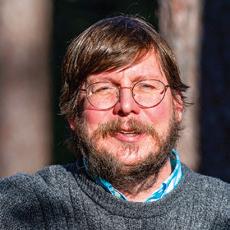
6 minute read
Faculty Award Winners
The Outstanding Public Service Award honors faculty who make significant contributions to the University of Maine’s mission of service— disseminating university resources into the community. It is among the most prestigious faculty awards bestowed by the College of Natural Sciences, Forestry, and Agriculture.
Jacquelyn Gill, Ph.D.
With every tweet, podcast, blog post and press interview, Jacquelyn Gill breaks down the ivory towers of higher education to connect people with science.
The associate professor of terrestrial paleoecology in the School of Biology and Ecology and Climate Change Institute’s ability to make science captivating has attracted over 89,000 followers to her Twitter profile—a following that places her among the top one percent of scientists on the social media platform. Gill’s blog, Contemplative Mammoth, draws 120,000 views per year and her podcast, Warm Regards, averages nearly 10,000 downloads per episode.
Gill uses these sizable communication platforms to ignite enthusiasm for her fields of paleoecology and paleoclimate, dispense truth amid the misinformation that abounds on the internet, and advocate for a more open and inclusive culture in the science fields.
“Her deft blending of innovative social media platforms with use of more traditional media has made her internationally recognized as a science communicator and advocate for a more diverse science workforce,” said Brian McGill, a colleague who nominated her for the award.
Offline, Gill’s science communication savvy is leading change worldwide. As co-founder and organizer of the March for Science, Gill’s movement swelled to a global event that included one million demonstrators at more than 600 locations. Her research has been featured by highly-regarded national and international media outlets and on three documentary programs. Opinion editorials Gill penned have been published in Scientific American and the Washington Post.
She is frequently invited to share her expertise in science communication and enhancing gender diversity in the STEM fields by organizations including the National Science Foundation, the State Department and the American Association for the Advancement of Science. She has also taken the stage as keynote speaker at public outreach events nationwide.
Gill recently served as Vice President of Communications and Public Affairs for the International Biogeography Society. She is currently a member-at-large of the Ecological Society of America’s Governing Board and on the Board of Directors for the South Atlantic Environmental Research Institute.
FACULTY AWARD WINNERS Outstanding Research Award
The Outstanding Research Award honors faculty who make significant contributions to their profession and have demonstrated excellence in scholarship. It is among the most prestigious faculty awards bestowed by the College of Natural Sciences, Forestry, and Agriculture.
Brian McGill, Ph.D.

When it comes to ecology, Brian McGill thinks big. The professor of biological sciences studies biodiversity on grand scales of space and time to predict how climate change and human activity will impact species distribution and community structure. Knowing where species are headed is critical to those making conservation and management decisions.
McGill has contributed significant thought leadership to his field of macro-ecology. His work established the importance of prediction in ecology and identified unifying principles in the field. He also spearheaded initiatives to address conceptual issues in his discipline related to the widely used and vaguely defined term bio-diversity. McGill and his colleagues developed a series of scientifically measurable concepts to resolve this long-standing source of ambiguity in the field of ecology and provided concrete tools to better measure and assess biodiversity in management contexts.
Through the blog Dynamic Ecology, McGill and two coauthors shape the way research is conducted in labs across the planet and initiate global conversations on pressing ecological questions. The blog, with 700,000 visits per year, is the most widely read in academic ecology.
His research has garnered more than $12 million in external funding and been the focus of 84 peer-reviewed papers in the past ten years. McGill’s findings are cited so frequently that he was named one of the 2019 Highly Cited Researchers worldwide by the Web of Science Group.
He also advances the work of others as Editor-in-Chief of Global Ecology and Biogeography and formerly as associate editor of Frontiers of Ecology and Environment, American Naturalist, and Global Ecology and Biogeography. McGill’s other contributions include reviewing dozens of papers each year and serving on NASA grant review panels and professional society award committees.
At UMaine, where he holds a joint appointment in the School of Biology and Ecology and the Mitchell Center for Sustainability Solutions and a cooperating appointment in the Climate Change Institute, he has mentored future scientists by serving on two dozen graduate student committees and teaching courses that are anchors in UMaine’s graduate environmental science programs.
His numerous awards include being elected a Fellow of the Ecological Society of America, an honor bestowed to approximately 250 of the society’s 9,000 members.
FACULTY AWARD WINNERS Outstanding Teaching Award
The Outstanding Teaching Award honors faculty who demonstrate their commitment to teaching and ability to deliver an excellent undergraduate learning experience. It is among the most prestigious faculty awards bestowed by the College of Natural Sciences, Forestry, and Agriculture.
Kelly Jaksa, M.S.W.
With an open door, heart and mind, Kelly Jaksa models the social work values she teaches her students.
The lecturer and coordinator of the Bachelor of Social Work program describes teaching as an extension of her identity as a social worker.
Her authenticity and empathy have proven irresistible to students. Although Jaksa is assigned 50 student advisees each year, she functionally mentors far more.
“She puts students first and has always maintained an open-door policy,” said Sandra Butler, director of the School of Social Work. “Her receptivity to working with students displaying mental health issues is particularly noteworthy given that such efforts can be intellectually and emotionally exhausting and time consuming. Her advising efforts are carried out selflessly and skillfully.”
Jaksa balances attending to these students with a heavy course load that attests to her versatility as an instructor. She teaches foundational social work courses for both the graduate and undergraduate programs. Graduate students encounter her again in their final year, as they hone their advanced practice and clinical skills.
Jaksa draws from over 14 years of clinical experience in community and healthcare settings to craft experiential learning exercises in her courses. Her pedagogy, unfailingly framed by her compassion, helps students cultivate their social work practice skills and ignites their enthusiasm for a career centered on helping others.
“Her experiences stand as examples of putting theory into practice and how we should all remain open and humbled by the privilege of being entrusted with the stories of our clients,” said Andrea Steward, a former student.






